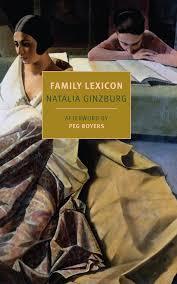
It’s bold to assert there was something lost in the translation of this memoir without having access to the source text and only basic knowledge of Italian. However, having translated since I could read, basically, and working as a professional translator I know enough to sympathize with the hard translation problems faced by Jenny McPhee, that translator, which don’t have satisfactory solutions. Ginzburg sets up the songs, expressions, and rhymes that characterized her parents and siblings as the framework for her story of growing up in Turin in the 1920s. Schoolyard chants, lyrics from old songs, jokes: texts that have a richness and particularity that are inextricable from the language they’re composed in. McPhee makes a valiant effort, but the results, rather than being charming, or funny or familiar, as is intended, are alienating to an English-speaking reader. They didn’t bring me closer, as a reader, to the people being affectionately, though honestly, recalled. There are also many mentions of Italian political and cultural figures that are obscure to non-Italian readers – for example, intellectuals involved in the anti-Fascist movement who are close friends of the Ginzburg’s parents.
The second half of the memoir, while much more serious and upsetting, is a better read. The kids are all grown up and facing the rise of fascism, anti-Semitism and World Word Two. Ginzburg’s father is arrested, and a brother has to flee the country. Her husband dies in prison, while their brilliant friend, the poet Cesare Pavese, commits suicide. Ginzburg and her young children are exiled to the countryside. The writing becomes more fluid, more direct and more analytical. While Ginzburg’s intention was primarily to draw a family portrait and obscure herself, I found the times she reveals her own thoughts, attitudes and experiences the most compelling.
Regarding the problems inherent in translating texts that rhyme, texts with cultural and historical associations, etc., an imperfect solution is to provide the source text in the end notes. More context concerning the family’s anti-Fascist friends, their place in Italian political history would have also been welcome as end notes, too, as Ginzburg does not reveal any of this background information, only their names and relationship to her family.
On the whole, I wouldn’t dissuade anyone from picking up this book, and I would definitely read other work by Ginzburg. The spare, unflinching descriptions of Turin during the war are powerful, and her portrait of Pavese is haunting. There is also a warm and a full understanding of her mother, an expansive depiction of a positive, kind woman facing hardship and choosing to remain kind.
